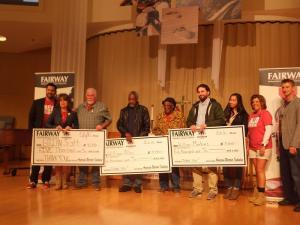Life after the service
Gen. William T. Sherman said “War is hell,” and Sean Parnell learned what he meant on his first day as a soldier in Afghanistan.
Parnell, who detailed his experiences in his book “Outlaw Platoon,’ described coming under a rocket attack when he and his unit landed at their forward operating base. The rockets missed the base, but hit a school close by. Parnell said he and his fellow soldiers rushed to the gates, where Afghani citizens had gathered with their injured children.
Parnell said he grabbed an injured girl and started rushing her to the nearby medical facility. But on the way there, a rocket went off 30 feet from him. He said he felt blood on his leg and thought it was his. When he looked at the girl however, he saw her leg was gone, blown off by the blast. By the time Parnell got the girl to the tent, she had died.
That first day set off a change in Parnell. After 18 months overseas, he returned to his hometown of Pittsburgh, where he told his old friends that story. He said his friends found it too depressing, leaving him to feel no one could relate to his experience.
When he went to buy a house, Parnell said he met a realtor who was the wife of a combat vet. She told him that if he wanted to relate his experience, she would listen. Hesitant at first, he began to talk about things that he’d kept bottled up.
Based on his experience, Parnell decided to do something to help his fellow vets readjust to civilian life. He joined up with the American Warrior Initiative, a program started by Louise Thaxton, a realtor with Fairway Mortgage with a specialty in helping veterans with home ownership. The initiative hosted a half-day course for realtors and mortgage professionals May 6 at Epworth United Methodist Church in Rehoboth Beach.
"The course started out as an educational program to certified real estate agents to become specialized to handle the housing needs of veterans. A huge issue when veterans return home is homelessness," spokeswoman Lauren Bentley said.
Thaxton said the American Warrior Initiative is a nonprofit group dedicated to helping real estate agents navigate the world of home ownership.
"This is what we do to give back," Thaxton said. "We have helped dozens of veterans and veterans families get business grants, service dogs, home renovation grants, mortgage-free homes, vehicles, whatever the need is. Our mission is, find the need locally and then fill the need."
Thaxton said the initiative, funded through donations, would host 50 boot camps around the country this year to train realtors and mortgage lenders to help fill the needs of veterans.
“I just wanted to continue to have a mission,” Parnell said. “If we can somehow smooth that transition point and help real estate agents on how to best to engage with them, I think we can have a profound impact on the country because the first thing guys want to do when they get back is buy a house and establish a life.”
Parnell, who was wounded during his service in Afghanistan, said if that first interaction with an agent is a positive one, it could have a profound effect on a veteran.
“I always marveled at how simple combat was. Live or die every day. That is the only thing you are concerned with. Life over here is so unbelievably complicated compared to life over there,” Parnell said.
The initiative made good on its promise May 6 when it gave three local veterans $5,000 each: Brian Scott of Dover, William Allen of Bridgeville and William Meekins of Lewes. Each of the three vets was touched by the gesture.
Allen, who served in the Navy during Vietnam, said, “For me, it shows that people do care. I know when I came home, we were called baby killers. Things have changed since then. I’m very grateful for this.”
Bentley said Allen was referred through a realtor and was nominated for the award by his wife. Meekins and Allen were both veterans who had struggled with homelessness through the years; Bentley said they were referred by the Veterans Administration.
Meekins did three tours in Iraq as a member of the Marine Corps.
“It can be hard for soldiers and servicemen to talk about what they’ve seen during war," Meekins said. "You’re always nervous about what you’re coming back to.”
For Meekins, the hardest thing was going over and coming back several times. It was almost easier to be in combat than in civilian life, he said.
“That’s not right,” Meekins said. “You’re always on your toes. Always alert. You never really relax.”
One thing he took out of the boot camp presentation was that servicemembers should be more comfortable talking about their experiences.
Scott, who served in the Marines from 1981 to 1985, said, “You can always tell who served and who hasn’t. There’s so many guys and girls that don’t know what to do. They just want somebody to talk to. Somebody to say it’s OK.”
Parnell said veterans often face trouble translating their military experience to real-world experience. He said the American Warrior Initiative offers help with business grants and designing business plans.
“It’s about giving them another mission they can galvanize under,” he said.

















































